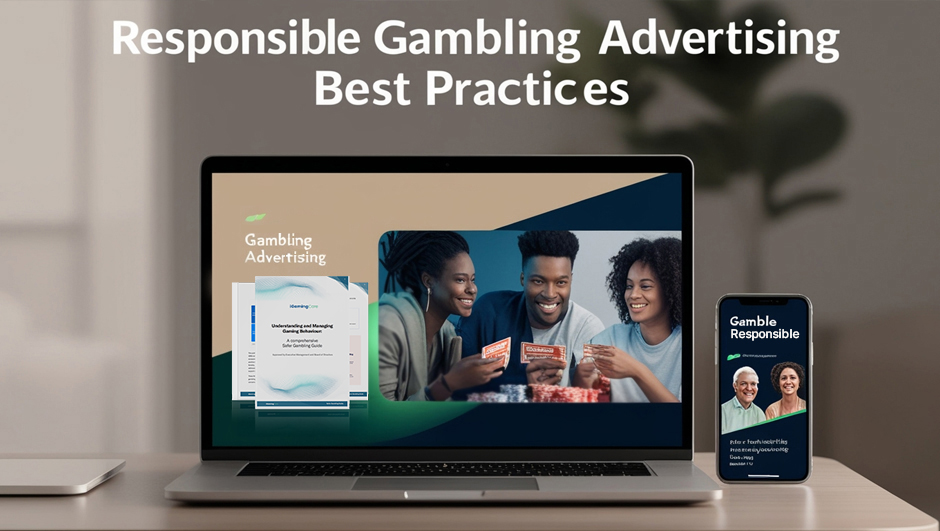
Why Responsible Advertising Matters in the Gambling Industry
Responsible advertising for gambling serves several purposes. In addition to making sure that vulnerable people are protected, it also helps maintain the integrity of the industry. It promotes the sustainable growth of well-regulated markets worldwide.
Key Principles of Responsible Gambling Advertising
There are several key principles of gambling advertisement – accuracy, transparency, non-exploitation, and age appropriateness. We’ve included all of them below, so let’s review them in more detail together:

-
Accuracy
Advertisements should provide truthful information about gambling products and services. Gambling should never be portrayed as a means to improve your financial status, so there shouldn’t be any exaggeration regarding potential winnings.
-
Transparency
Very few things in life come free, and that applies to gambling promotions. Every bonus has its terms and conditions, which should be clearly disclosed. These include things like minimum required deposit, validity period, and playthrough requirements.
-
Non-Exploitation
To add to the previous points, advertising for gambling should avoid exploiting vulnerable individuals or suggesting that gaming can solve financial problems. Such activities are merely a fun pastime, and this is precisely how they should be portrayed.
-
Age Appropriateness
Is underage gambling illegal? Yes, it most definitely is. Casino and sports gambling advertising materials must not be designed to appeal to minors, given child gambling is prohibited. Promotions must not target people under the minimum required age – usually 18 or 21.
Regulatory Guidelines and Standards
Every country has its regulatory framework and restrictions, including national and regional gambling advertising laws. In the US, for example, gambling promotions are regulated on both the federal (Federal Trade Commission Act) and state levels. The American Gaming Association (AGA) has established a Responsible Marketing Code for Sports Wagering that focuses on proper messaging and the protection of minors.
In the United Kingdom, gambling marketing is governed by the Gambling Act 2005 and overseen by the UK Gambling Commission and the Advertising Standards Authority (ASA). Similarly to the US and any other regulated market, minors gambling is illegal. Any advertising should not appeal to underage groups of the population. There are watershed restrictions on TV ads, and online ads are available only after age verification.
Other countries like Australia, Germany, Canada, Spain, and the Netherlands have also imposed strict advertising restrictions. These include a ban on ads near schools and youth facilities, limits on online/mobile/TV/radio promotions, mandatory reminders that gambling can be addictive and display of problem gaming helplines.
Gambling Ad Policies Across Countries
The following table provides a comparison of gambling advertising policies in different countries, highlighting key regulations, restrictions, and mandatory requirements. If you look closely, you’ll find many similarities.
| Country | Key Advertising Regulations | Restrictions | Mandatory Requirements |
|---|---|---|---|
| United States | Federal Trade Commission Act State-level gambling laws AGA’s Responsible Marketing Code for Sports Wagering |
No ads targeting minors Restrictions on TV/radio ads Limits on online/mobile ads |
Clear disclosure of odds and risks Responsible gambling messaging Disclosure of the threat of potential gaming addictions |
| United Kingdom | Gambling Act 2005 UK Advertising Codes Consumer Protection from Unfair Trading Regulations |
No ads appealing to minors Watershed restrictions on TV ads Limits on celebrity endorsements |
Prominent responsible gambling info Age verification for online ads Independent pre-vetting of ads |
| Australia | Interactive Gambling Act 2001 Australian Consumer Law |
Bans on live odds during events Restrictions on bonus offer ads Limits on outdoor/online ads |
Clear messaging on risks and self-exclusion Gambling harm awareness campaigns |
| Germany | Interstate Treaty on Gambling State-level gambling laws |
Bans on TV/radio ads before 9 PM Restrictions on online/mobile ads No ads near schools or youth facilities |
Age verification for online ads Prominent display of responsible gambling info |
| Canada | Criminal Code of Canada Provincial gambling acts |
Bans on ads that target minors Restrictions on content and placement Limits on bonuses and free play offers |
Mandatory display of problem gambling helplines Independent review of marketing materials |
| Spain | Gambling Act 2011 Royal Decree on Advertising |
Bans on ads during live sports Restrictions on TV/radio ads Limits on online/mobile ads |
Prominent display of odds and risks Age verification for online ads |
| Netherlands | Gambling Act 2021 Advertising Code for Games of Chance |
Bans on ads near schools and youth facilities Restrictions on TV/radio and outdoor ads Limits on online/mobile ads |
Clear risk warnings and responsible gambling info Age verification and spending limit controls |
Gambling Ads Policy by Advertising Platform
Gambling ad policies may vary depending on the platform, but they also revolve around the same pillars, including avoiding misleading and deceptive messages and claims, stressing the importance of responsible gambling, and not targeting minors.
| Ad Platform | Geographic Restrictions | Content Restrictions | Responsible Gambling Requirements | Certification/ Compliance |
|---|---|---|---|---|
| Google Ads | Allowed in select countries with valid licenses. | No misleading claims; must not target minors. | Include responsible gaming messages. | Requires certification and compliance with local laws. |
| Facebook Ads | Allowed in certain regions; must comply with local regulations. | No deceptive practices; must not imply financial gain. | Responsible gaming messaging required. | Prior written permission needed for gambling ads. |
| Instagram Ads | Same as Facebook; varies by region. | No misleading claims; must include responsible messaging. | Responsible gambling messaging required. | Same compliance as Facebook; prior permission needed. |
| Twitter Ads | Restricted in certain regions; compliance required. | No false claims; must not target minors or illegal areas. | Promote responsible gambling practices. | Authorization needed based on jurisdiction. |
| YouTube Ads | Allowed in select countries with appropriate licensing. | No misleading content; must not target minors. | Include responsible gambling information. | Compliance with Google Ads policies is mandatory. |
| Snapchat Ads | Allowed in select regions; compliance required. | No misleading content; promote responsible practices. | Responsible gaming messaging required. | Compliance with local regulations is necessary. |
| TikTok Ads | Varies by region; must comply with local regulations. | No deceptive content; promote responsible practices. | Responsible gambling messaging required. | Compliance with local laws and guidelines is essential. |
Implementing Responsible Advertising Strategies
We already covered the main regulations, requirements, and restrictions, but how are they actually implemented into responsible advertising strategies? A detailed target audience analysis is one of the primary elements of responsible marketing in the gambling industry. Any campaign should target appropriate audiences, excluding minors and vulnerable groups.
The content of the promotional materials is also crucial in ensuring compliance with responsible gambling practices. That said, procedures are established to review all details before a marketing campaign is given the green light to go live. Moreover, team members undergo extensive training to understand the principles and regulatory requirements.
Monitoring and Evaluation

Another important aspect is tracking the effectiveness of responsible advertising initiatives. This happens through key performance indicators (KPIs) determining whether a marketing campaign has succeeded. This information will help advertisers know what to improve in their future projects.
There are different channels for customers and stakeholders to report concerns about advertising content. In the UK, for example, you can submit an official complaint to the Advertising Standards Authority (ASA). In turn, the ASA will review your complaint and request that the advert is amended or withdrawn. Failure to do so will result in more severe consequences.
The ultimate goal is to join forces to create a responsible gambling environment for all parties involved. This can only happen through continuous improvement, including regular assessments and updates, so advertising practices align with the evolving standards and societal expectations in terms of safety and transparency.
Best Practices for Gambling Advertising and Promotion

Both land-based and online gambling advertising should incorporate responsible gambling messages. This means including clear information about the harmful consequences such activities could potentially have on players and their families and friends. Marketing campaigns should also feature details about support resources and organizations such as Gamblers Anonymous and Gambling Therapy.
Many countries limit the frequency and placement of gambling ads to avoid excessive marketing, especially in mediums accessible to minors. One example we already mentioned earlier in this article is Germany and its ban on TV/radio ads before 9 PM. In addition, the country also doesn’t allow gambling ads near schools or youth facilities.
Another excellent and very successful practice in responsible gambling advertising is the avoidance of misleading claims. It should never be suggested that betting on online platforms could be a viable solution to financial difficulties. It should also be clear that there’s no guarantee of potential rewards – after all, gambling is primarily luck-based.
Additional Support and Resources
If you’re looking for more information, want to stay up to date with the latest news from the industry, or submit a complaint, we recommend engaging with organizations that guide responsible advertising. In the US, for example, the American Gaming Association (AGA) is a great choice. In the UK, it’s the Advertising Standards Authority (ASA).
In Germany, you can submit complaints and feedback about gambling ads to the Gemeinsamen Glücksspielbehörde der Länder (GGL), or Joint Gambling Authority of the States in English. If you’re from the Netherlands and think that a marketing campaign violates the Dutch Advertising Code (DAC), you should submit an official complaint with the Advertising Code Committee (ACC).
Conclusion
Commitment to ethical marketing practices in the gambling industry is the responsibility of countries, individual operators, and advertisers. But, as consumers of this content, it should also be our priority to raise red flags if we see any illegal or questionable advertising practices and promotional materials. Your feedback and opinion matter, so don’t hesitate to share them with the relevant authorities in your country.

